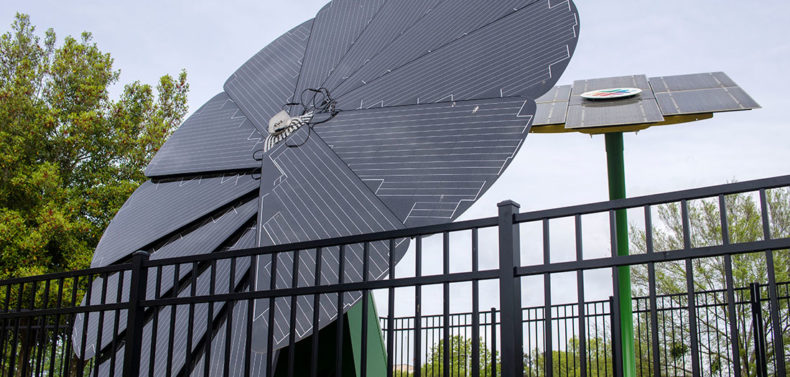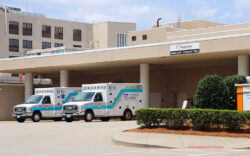It’s been almost two years since the Athens-Clarke County Mayor and Commission approved the 100% Athens resolution committing the local government to 100% clean energy by 2035 and the entire community by 2050. With less than 15 years left to make the first part of the transition, Athens still lacks a comprehensive plan for how to accomplish it.
Even so, a number of initiatives are currently underway that will move the local government closer to its environmental goals. For example, the commission discussed four agenda items related to reducing climate emissions just last month. Additionally, the Clean and Renewable Energy Plan advisory board has finalized its community survey and is planning a series of clean energy town hall meetings, coming soon.
Hybrid Vehicles: Where possible, most new vehicles purchased by the ACC government are now hybrid gasoline-electric vehicles. This includes new police interceptors. Nine police cars—Chevy Impalas or Ford Interceptor sedans—have been destroyed in wrecks in the past couple of years. While unfortunate, this does allow their replacement by more fuel-efficient hybrid Ford Interceptor SUVs getting 23 miles per gallon in the city versus 19 for the previous vehicles.
Commissioner Jesse Houle questioned the purchase of SUVs instead of smaller sedans, but it turns out that this particular model is the only pursuit-rated hybrid vehicle on the market. Despite being larger, the Ford Interceptor hybrid SUV is 21% more fuel-efficient than the previous Chevy Impalas for city driving.
Energy Audit: Last year, the local government completed a set of energy audits, which recommended 35 high-priority energy conservation measures to be paid for using money from the 2011 SPLOST. These measures have a total cost of $98,000, but they are estimated to save $23,000 and 86 tons of carbon dioxide emissions yearly. These energy-saving measures include switching to LED lightbulbs, upgrading HVAC systems and installing smart thermostats. The investment is estimated to be returned in under four years once various rebates are factored in.
Rooftop Solar: The ACC Library already has one solar array, but it’s about to get more. After the library’s roof is replaced this fall, construction of a new rooftop solar array will begin at a price of $280,000, if approved by the commission. It will supply up to 16% of the energy used by the library and will reduce operating costs by about $16,000 a year.
Surprisingly, this project won’t need to dip into the $15.8 million renewable energy package from SPLOST 2020 and will be paid for using SPLOST 2011 dollars, along with money from various solar rebate programs.
Building Construction: Lastly, and perhaps most significantly, the commission’s Legislative Review Committee brought forward its recommendations for a new sustainable building policy to the full commission. This policy governs the “design, construction and alteration” of all ACC-owned buildings. Changes to the policy include ensuring solar readiness of new buildings and, if not actually requiring solar panels, requiring various efficiency improvements—such as programmable thermostats, LED light bulbs and dual-flush toilets—and mandating electric vehicle charging stations and bicycle parking in all parking lots with at least 14 spaces.
The new policy also discourages the use of natural gas, promoting the use of solar and other sources of renewable energy instead. It also includes a provision requiring an update to the policy after the local government adopts a plan to achieve 100% clean energy, and every five years after that, to ensure it stays current as technology advances.
Planning for the Future: The 100% Athens resolution, passed in May of 2019, called for a plan to achieve 100% clean energy for the ACC government to be drafted within 18 months. Twenty-two months later, the plan has yet to be finalized in part due to delays from the COVID-19 pandemic. Mayor Kelly Girtz appointed a Clean and Renewable Energy Plan advisory board last June to draft a proposal, which is currently under discussion and should be presented to the mayor and commission towards the end of this year.
Before then, the advisory board is soliciting public input in a number of ways, which will help them tailor the plan to suit the needs of Athens residents. In addition to direct outreach to business owners, the board has released a community survey and is holding a series of virtual town hall meetings. Two more remain, one Thursday, Apr. 22 at 6:30 p.m. and one Tuesday, Apr. 27 at 11:30 a.m. Register to participate at accgov.com/100 or watch the archived videos at youtube.com/accgov.
Like what you just read? Support Flagpole by making a donation today. Every dollar you give helps fund our ongoing mission to provide Athens with quality, independent journalism.










